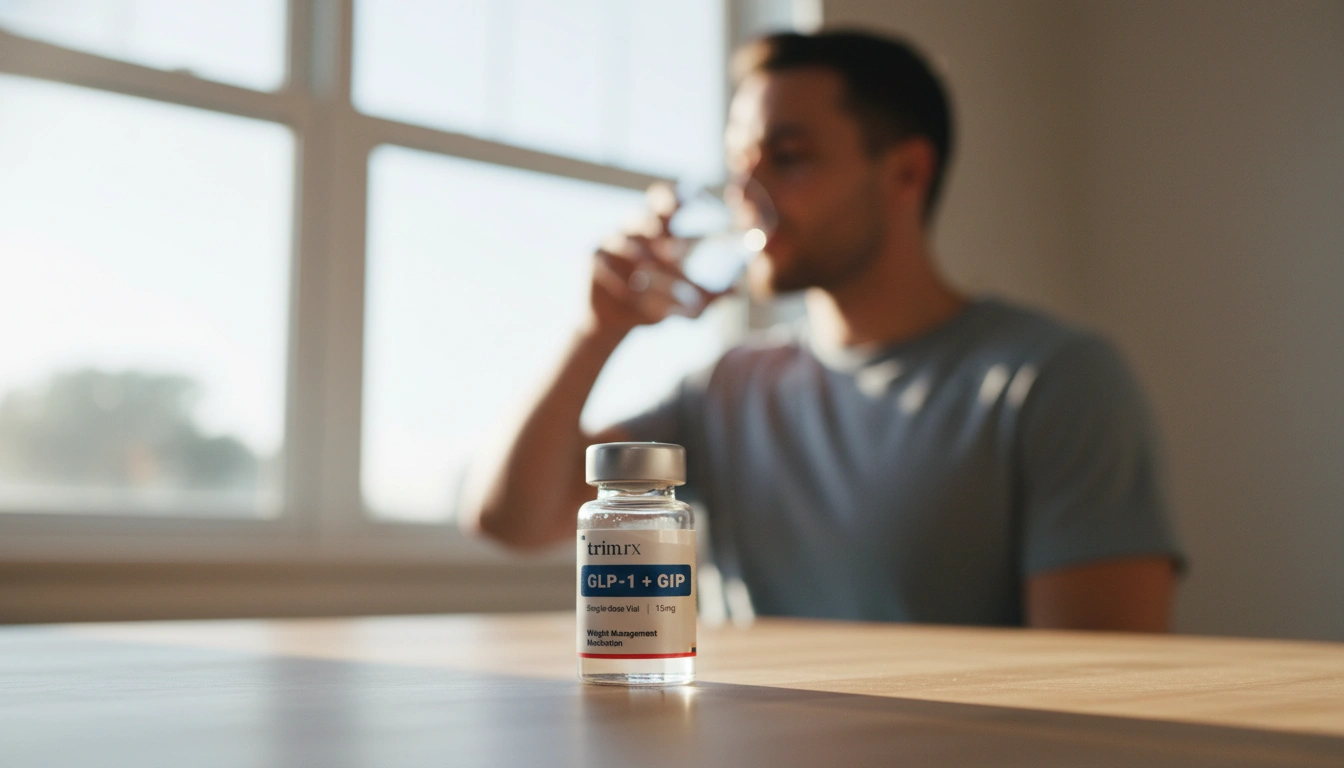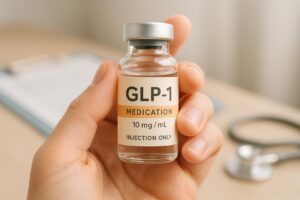What to Do When GLP-1 Stops Working: Navigating the Weight Loss Journey

Introduction
Have you ever felt like you were on the verge of a breakthrough, only to hit a frustrating wall? This is a common experience for many individuals using GLP-1 medications for weight loss, such as Semaglutide (Ozempic, Wegovy) and Tirzepatide (Mounjaro). While these medications have revolutionized weight management for countless people by promoting significant weight loss, many find themselves facing a plateau after some initial success. It’s a situation that raises questions and concerns: What happens when GLP-1 drugs seem to stop working? Why does this occur, and what can we do about it?
In this blog post, we will delve deep into the intricacies of GLP-1 medications, exploring why they might lose efficacy over time and presenting actionable strategies to overcome these hurdles. We aim to provide you with a better understanding of the mechanisms at play, the importance of personalized care, and how we, at TrimRx, can assist you on your journey to sustainable weight loss. By the end of this article, we hope you’ll feel empowered to tackle plateaus and continue your progress toward a healthier lifestyle.
We’ll cover the following topics:
- Understanding GLP-1 Medications
- Why GLP-1 Medications May Stop Working
- Strategies to Overcome Weight Loss Plateaus
- The Importance of Lifestyle Changes
- Exploring Alternative Treatments
- Conclusion and FAQs
Understanding GLP-1 Medications
Before we dive into the challenges associated with GLP-1 medications, it’s essential to understand what they are and how they work. GLP-1, or glucagon-like peptide-1, is a hormone that plays a crucial role in glucose metabolism and appetite regulation. Medications that mimic this hormone, such as Semaglutide and Tirzepatide, have been shown to help individuals with obesity or overweight manage their weight more effectively.
Mechanism of Action
GLP-1 medications work primarily by:
- Enhancing Satiety: They signal the brain to reduce hunger, making it easier to eat less.
- Slowing Gastric Emptying: This leads to feeling full for a longer period after meals.
- Improving Insulin Sensitivity: They help lower blood sugar levels by enhancing insulin secretion when glucose levels are high.
In clinical trials, participants using these medications have reported significant weight loss—ranging from 15% to 20% of their body weight—demonstrating the potential effectiveness of GLP-1 drugs in managing obesity.
Our Commitment at TrimRx
At TrimRx, we believe in a personalized approach to weight loss. That’s why we offer a comprehensive service that begins with a free assessment quiz. This quiz helps us tailor a treatment plan that aligns with your specific needs and health goals. If you’re interested, you can take our free assessment quiz here.
Why GLP-1 Medications May Stop Working
Despite the initial success many experience with GLP-1 medications, it’s not uncommon for weight loss to plateau over time. Understanding the biological and psychological reasons behind this phenomenon can help mitigate frustration and provide clarity on the next steps.
The Body’s Set Point Theory
One primary explanation for weight loss plateaus is the concept of the “set point.” The body naturally strives to maintain a certain weight, which is influenced by genetics, metabolism, and hormonal responses. When individuals lose weight, the body’s metabolism may slow down in an attempt to conserve energy, making further weight loss more challenging.
Dr. Fatima Cody Stanford, a leading obesity medicine physician, describes this as a “tug of war” between the body’s natural defenses and the weight loss strategies employed. As weight decreases, the body activates hunger hormones, such as ghrelin, to signal the need for more food intake. This can lead to a feeling that the medication is no longer effective, even when it still works as intended.
Psychological Factors
Psychological factors also play a significant role in weight management. After initial weight loss, many individuals may become discouraged by the slower pace of progress, leading to emotional eating or decreased motivation to maintain healthy habits. This psychological component can be as influential as the physiological aspects of weight management.
Medication Tolerance
Another factor to consider is medication tolerance. Over time, the body may adapt to the effects of GLP-1 medications, resulting in diminished responses. This is not uncommon with many types of medications, and it may prompt the need for adjustments in dosage or treatment strategies.
Strategies to Overcome Weight Loss Plateaus
Now that we understand some of the reasons behind the plateau effect, let’s explore strategies to break through these barriers and continue on the path to successful weight loss.
1. Reassess Your Goals and Expectations
The first step in overcoming a plateau is to reassess your weight loss goals. It’s essential to recognize that weight loss is not linear; there will be ups and downs along the way. Reflect on your journey and celebrate the successes you’ve achieved, no matter how small.
2. Consult with Your Healthcare Provider
Open communication with your healthcare provider is vital. If you’re experiencing a plateau, discussing your concerns can lead to adjustments in your treatment plan. At TrimRx, our personalized approach includes regular consultations to ensure you are on the right track. We provide compassionate care that respects your unique journey and offers support tailored to your needs.
3. Adjust Medication Dosage
If you have hit a plateau, it may be time to evaluate your medication dosage. In some cases, increasing the dosage of your GLP-1 medication may reignite weight loss. However, this should only be done under the guidance of a healthcare professional.
4. Explore Combination Therapies
Combining GLP-1 medications with other weight loss agents can enhance effectiveness. For instance, some patients benefit from adding medications that target different receptors in the brain, such as phentermine or metformin. This multifaceted approach can help address weight loss resistance.
5. Tapering the Dose
For some individuals, tapering the dose of GLP-1 medications may help. By reducing the dosage, the body can sometimes reset its response, allowing for renewed weight loss. This strategy should be approached cautiously and under medical supervision.
The Importance of Lifestyle Changes
While medication plays a vital role in weight management, lifestyle changes are equally important. Sustainable weight loss is best achieved through a combination of medication, dietary adjustments, and physical activity.
1. Nutrition
Reevaluating your dietary habits can make a significant difference. Consider working with a registered dietitian to create a balanced eating plan that aligns with your goals. Focus on whole foods, such as fruits, vegetables, lean proteins, and whole grains, while minimizing processed foods and added sugars.
2. Physical Activity
Incorporating regular physical activity is crucial for maintaining weight loss and promoting overall health. Aim for a mix of cardiovascular exercises and strength training. Resistance training, in particular, is beneficial for preserving lean body mass, which is essential for a healthy metabolism.
3. Mindful Eating
Practicing mindful eating can help you become more aware of your hunger cues and emotional triggers. Take the time to savor your meals, and listen to your body when it signals fullness. This approach can help prevent overeating and reinforce healthy eating habits.
Exploring Alternative Treatments
If you find that GLP-1 medications are no longer effective, it may be time to explore alternative treatments. At TrimRx, we offer a range of options tailored to your specific needs.
1. Other GLP-1 Medications
There are newer GLP-1 medications on the market, such as Zepbound (Tirzepatide), which may provide different mechanisms of action and could be more effective for some individuals. Speak with your healthcare provider about whether switching to a different medication is appropriate for you.
2. Behavioral Health Support
Addressing the psychological aspects of weight management is crucial. Engaging in behavioral health support can help you navigate emotional eating, stress management, and motivation. Our team at TrimRx is committed to providing holistic support, including access to mental health resources.
3. Surgical Options
For individuals with severe obesity who have not found success with medications or lifestyle changes, surgical options may be worth considering. Bariatric surgery can lead to significant weight loss, but it requires careful consideration and consultation with a qualified healthcare provider.
Conclusion
Navigating the world of weight loss can be challenging, especially when faced with plateaus in medication efficacy. Understanding the biological, psychological, and lifestyle factors at play is essential for overcoming these hurdles. At TrimRx, we are dedicated to providing personalized, medically supervised care that supports your unique journey toward sustainable weight loss.
If you are currently using GLP-1 medications and find yourself at a standstill, we encourage you to reach out for support. Our team is here to help you explore adjustments to your treatment plan, including the possibility of taking our free assessment quiz to assess eligibility for personalized weight loss programs. Remember, you are not alone in this journey, and together we can work toward achieving your health goals.
FAQ
What should I do if I hit a plateau while taking GLP-1 medication?
Reassess your goals, consult with your healthcare provider, consider adjusting your medication dosage, and explore lifestyle changes.
How long does it typically take to see results from GLP-1 medications?
Many individuals experience significant weight loss within the first 12 weeks, but results can vary based on individual circumstances.
Can I safely increase my dosage of GLP-1 medication?
Any changes to medication dosage should be done under the supervision of a healthcare professional to ensure safety and effectiveness.
Are there alternative treatments if GLP-1 medications stop working?
Yes, options include other GLP-1 medications, behavioral health support, and surgical interventions, depending on individual needs.
How can TrimRx help me with my weight loss journey?
TrimRx offers personalized assessment quizzes, tailored treatment plans, ongoing support, and resources to help you achieve sustainable weight loss.
For more information on our services or to take the free assessment quiz, visit us at TrimRx. Together, we can pave the way to a healthier, happier you!

Transforming Lives, One Step at a Time
Keep reading
GLP-1 Medication Side Effect Checker
Worried about GLP-1 medication side effects? Use our free checker for Semaglutide, Liraglutide, and more to learn what to expect and stay informed!
GLP-1 Dose Titration: Research Insights
Gradual GLP-1 dose increases balance weight loss and GI side effects; personalized titration and monitoring improve real-world outcomes.
Wave Life Sciences unveils Phase I results for obesity treatment
Wave Life Sciences’ single-dose RNA therapy showed 4% total body fat reduction and promising Phase I results.



